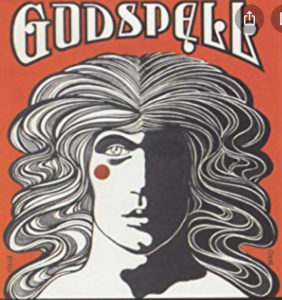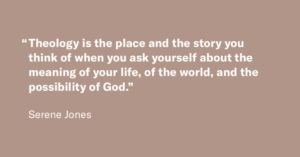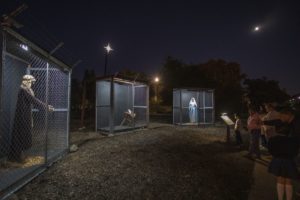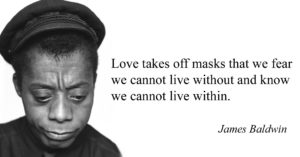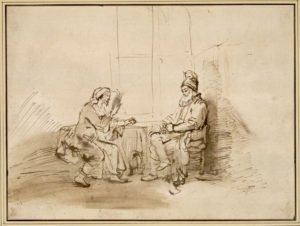Jesus
Love More Dearly
February 9, 2020O most merciful Redeemer, Friend and Brother,
May I know Thee more clearly,
Love Thee more dearly,
And follow Thee more nearly.
—St. Richard, Bishop of Chichester (1197–1253)
“God comes to us disguised as our lives.” -Paula D’Arcy
[The musical is structured as a series of parables, primarily based on the Gospel of Matthew.]
‘Pay attention to the wisdom of those “on the bottom.” Throughout history, some people have assumed unearned privilege, most often by denying the inherent God-given dignity of others. Christians and so-called Christian nations have been and continue to be responsible for this violence just as much as other religions and societies. Why do we continue to get it so wrong when Jesus
[The real Jesus. Not the Christian Jesus.]
told us that loving God and our neighbor are the first commandments (see Matthew 22:34-40)? His teachings turned power on its head: the last will be first and the first will be last, Jesus reminded us (see Matthew 20:16).
How we know and what we know are shaped by our experience. Speaking for myself, it is clear that my privilege as a white, formally educated, financially secure man (even though I am a Franciscan) influences what I see and how I understand it. My privilege also limits my perspective in many ways. While I didn’t choose to “have” while others “have not,” if I’m not actively working toward equity, even my passive participation enables systems of inequality and injustice. Jesus continually invites me to see differently by encountering and engaging with those on the bottom.
The system benefitting me was never intended to benefit all. And because the system benefits me, I don’t need to see it clearly. On the other hand, those who do not receive its benefits are required to see it for their very survival. Thus, God calls us to “not conform to the pattern of the world but to be transformed by the renewing of our minds” through relationship with those who see life from a different perspective than we do (see Romans 12:2).
Keep in mind:
1. Injustice results from systems, structures, and institutions more than individual choices and actions.
2. Each person has a unique story, so no single individual can represent an entire group.
3. Be aware that oppression, like the ego, shape-shifts and is hard to pin down. It will always find a new manifestation.
4. Each created being is made in God’s image; and this God is love.
Simply notice and observe reactions rather than resist or judge them. Expanding our perspective moves us out of comfort zones, so this may be an important time to practice some form of contemplative prayer or meditation. -Fr Richard Rohr
Let the farthest, oldest, most ancient ancestors speak to us!
And let us be listeners at last, humans
finally able to hear.
Rilke
Public Theology
December 11, 2019[Serene Jones is the President and Johnston Family Professor for Religion and Democracy at Union Theological Seminary in the City of New York. She was formerly the Titus Street Professor of Theology at Yale Divinity School and chair of gender, woman, and sexuality studies at Yale University.]
“…good theology absolutely must be public theology. What is theology, if it’s not talking about our collective lives and the meaning and purpose of our lives and how we’re supposed to live together and who God is, in ways that are part of our conversation together?
[…]
God creates us to be glorious: gives us powers of intellect and love and connection and art, and we’re capable of amazing, extraordinary accomplishments. And yet, right next to this glorious side is this weird propensity that human beings have to choose what is not good for them, to choose evil, to sin, to close their eyes to the love of God and their own glory and to become harmful and self-destructive and destructive of others. And life is the struggle of those two realities within us. And they never go away. It’s not like you get over the sin part and become glorious; it’s not like you’re ever only sinful. That is the complex nature of who we are.”
[A Nativity scene at Claremont United Methodist Church in California depicts Jesus, Mary and Joseph separated and caged, as asylum seekers detained by ICE. Baby Jesus is wrapped in a foil blanket.]
“And the second thing I’d say about this political moment — and it’s a deeply theological claim — is, I honestly think, at the heart of our nation’s turmoil is the fact that people honestly do not believe that we are all equal and loved equally and equally valued. They just don’t believe that.”
‘You’re set free, actually, by the telling of the truth.’
“I realize that it’s my work to do, but I’m not going to be here to see what comes. And that’s OK. But we got a lot of work to do in these next years, all of us together, even if we don’t know where we’re going.”
And then James Baldwin says,
“I use the word ‘love’ here not merely in the personal sense, but as a state of being, or a state of grace, not in the infantile American sense of being made happy, but in the tough and universal sense of quest and daring and growth.”
❥
Bernice King.
May 26, 2019“Jesus was not a white, American man.
The U.S. flag is not a symbol for the Church or for Christ.
The National Anthem is not a Christian Hymn.
And He [Jesus] began to teach and say to them, “Is it not written, ‘My house shall be called a house of prayer for all the nations’?”
-Bernice King is a ‘connector, communicator, community builder, CEO of The King Center, and child of legendary global influencers.’
Wisdom Questions
January 13, 2019In the Near East “wisdom teacher” is a recognized spiritual occupation. I was taught that there were only two categories of religious authority: one could be a priest or a prophet. That may be how the tradition filtered down to us in the West. But within the wider Near East (including Judaism itself), there was also a third, albeit unofficial, category: a moshel moshelim, or teacher of wisdom, one who taught the ancient traditions of the transformation of the human being.
They spoke to people in the language that people spoke, the language of story rather than law.
Jesus not only taught within this tradition, he turned it end for end. Before we can appreciate the extraordinary nuances he brought to understanding human transformation, we need first to know something about the context in which he was working.
Jesus was not a priest. He had nothing to do with the temple hierarchy in Jerusalem, and he kept a respectful distance from most ritual observances. Nor was he a prophet in the usual sense of the term: a messenger sent to the people of Israel to warn them of impending political catastrophe in an attempt to redirect their hearts to God. Jesus was not that interested in the political fate of Israel, nor would he accept the role of Messiah continuously being thrust upon him.
Rather, he stayed close to the ground of wisdom: the transformation of human consciousness. He asked timeless and deeply personal questions: What does it mean to die before you die? How do you go about losing your little life to find the bigger one? Is it possible to live on this planet with a generosity, abundance, fearlessness, and beauty that mirror Divine Being itself?
These are the wisdom questions, and they are the entire field of Jesus’ concern.
-Cynthia Bourgeault, Episcopal priest and one of CAC’s [Center for Action & Contemplation] core faculty members.
Einstein, too.
October 29, 2018A human being is a part of the whole, called by us “Universe,” a part limited in time and space. [One] experiences [oneself] . . . as something separated from the rest—a kind of optical delusion of [one’s] consciousness. . . . Our task must be to free ourselves from this prison by widening our circle of compassion to embrace all living creatures and the whole of nature in its beauty. —Albert Einstein
☆
“If your eye is healthy, your whole body is full of light” (Luke 11:34). That’s why the Buddha and Jesus say with one voice, “Be awake.” Jesus talks about “staying watchful”, and “Buddha” means “I am awake” in Sanskrit. —Richard Rohr
The Truth is that which is.
February 20, 2017‘It is more useful to realize that we each carry a Jesus and a Nicodemus within us; that is, we each have a divine inner voice that opens us to truth and a mediating social voice that is reluctant to show its truth to others.
…quiet pain comes from not honoring what we know to be true, even if all we know to be true are the questions we are asking.
True and False Self (D. W. Winnicott) – – it is the True Self that lets us know what is authentic and what has become artificial, while the False Self is a diplomat of distrust, enforcing a lifestyle of guardedness, secrecy, and complaint.
In everyday terms this means that each time we experience a change in reality as we know it, we must choose whether to declare or hide what we know to be true. At such moments we either need to bring the way we have been living into accord with that shift of reality, or we need to resist the change […] having to admit that what was essential is no longer essential and then needing to summon the courage to make the act of living essential again.’
-Mark Nepo
